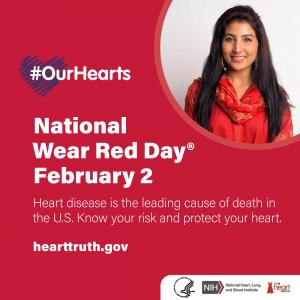| News & Alerts for FCMG | View All |
February is Heart Health Month
FCMG joins health care providers nationwide in recognizing February as National Heart Month! To be sure you're following a healthy heart regimen, check with your FCMG provider. Meantime, here is some information we hope you'll find useful! (Remember, YOU can help raise awareness of heart health too, by participating in National Wear Red Day -- February 2nd. This year's theme is The Heart Truth!)
Preventing Heart Disease:
- Move it or lose it: Regular physical activity strengthens your heart, boosts circulation, and helps manage weight. Aim for at least 150 minutes of moderate-intensity exercise or 75 minutes of vigorous exercise per week.
- Fuel your body wisely: Choose a balanced diet rich in fruits, vegetables, whole grains, and lean protein. Limit saturated and trans fats, cholesterol, and sodium.
- Mind your blood pressure and cholesterol: Get regular checkups and manage these key risk factors with medication or lifestyle changes if needed.
- Don't smoke: Smoking significantly damages your heart and blood vessels. Quitting is the single best thing you can do for your cardiovascular health.
- Manage stress: Chronic stress can take a toll on your heart. Find healthy ways to manage stress, such as yoga, meditation, or spending time in nature.
Warning Signs of a Heart Condition:
- Chest pain or discomfort: This can be a dull ache, a sharp pain, or a squeezing sensation. It can extend to the arms, back, neck, or jaw.
- Shortness of breath: Difficulty breathing, especially during activity or while lying down, could be a sign of heart problems.
- Fatigue and weakness: Feeling unusually tired or lacking energy without clear explanation can be a warning sign.
- Palpitations: Irregular or racing heartbeats can be an indicator of an underlying heart issue.
- Swelling in legs or ankles: Fluid buildup in the lower extremities can be a symptom of heart failure.
Symptoms of a Heart Attack:
- Sudden and intense chest pain: This can feel like a crushing pressure, burning, or tightness. It may come and go or be constant.
- Pain radiating to the arms, back, neck, jaw, or stomach: The pain can spread beyond the chest.
- Shortness of breath: You may feel difficulty breathing even at rest.
- Cold sweat: Profuse sweating for no apparent reason could be a warning sign.
- Lightheadedness or dizziness: Feeling faint or like you might pass out can indicate a heart attack.
- Nausea or vomiting: These symptoms can accompany a heart attack, especially in women.
Want even more information? Check out these flyers and literature from the NIH's National Heart, Lung & Blood Institute:
- Are You Heart Smart? What to Know for a Healthier Heart
- Healthy Eating for a Happy Heart
- Reduce Stress for a Healthier Heart
- Make Heart Health Part of Your Self-Care Routine
- Celebrate American Heart Month: Join the #OurHearts Movement
- Bring American Heart Month to Your African American Community: Join the #OurHearts Movement
- Bring American Heart Month to Your Hispanic/Latino Community: Join the #OurHearts Movement
- Bring American Heart Month to Your Hispanic/Latino Community: Join the #OurHearts Movement (in Spanish)




